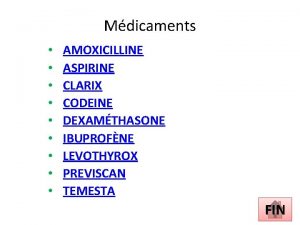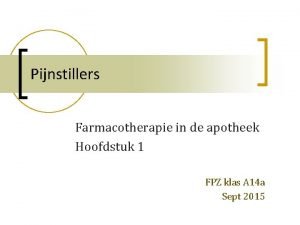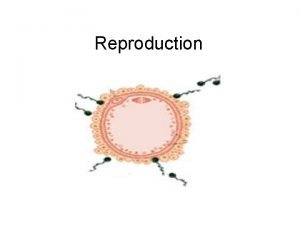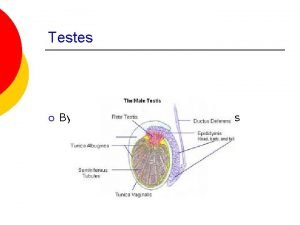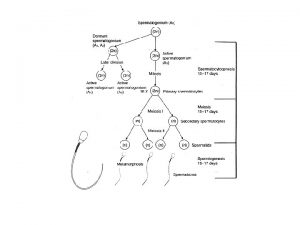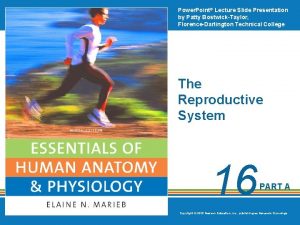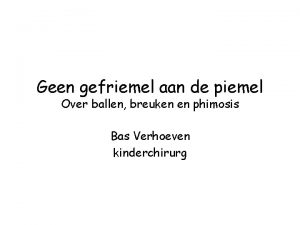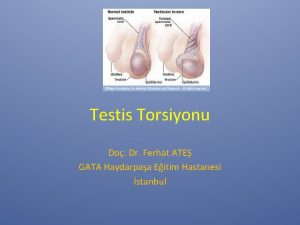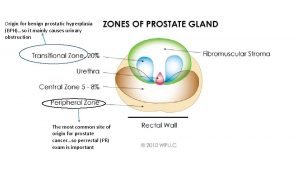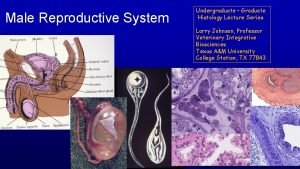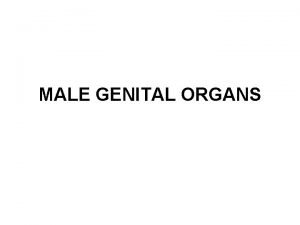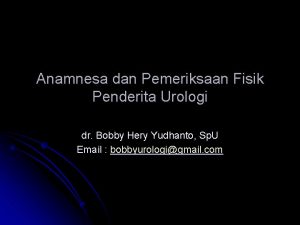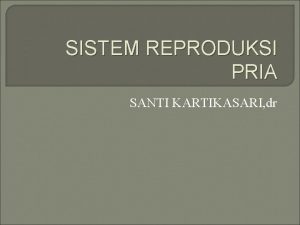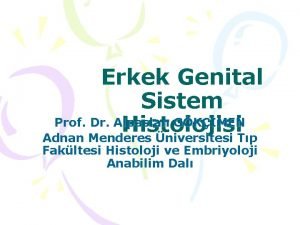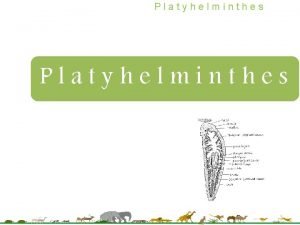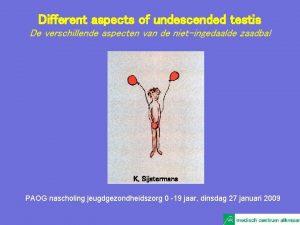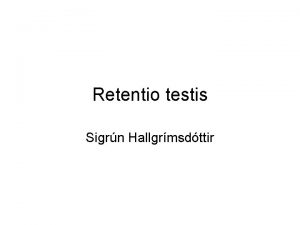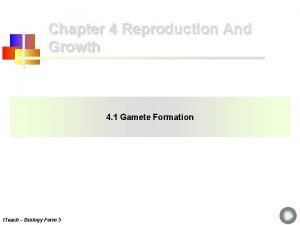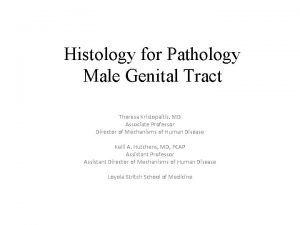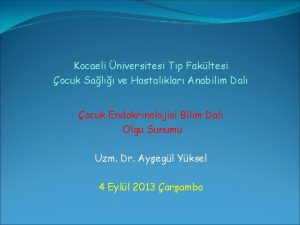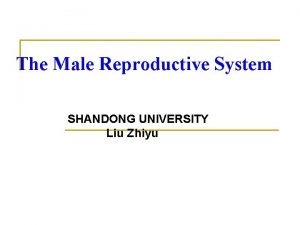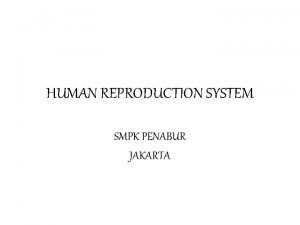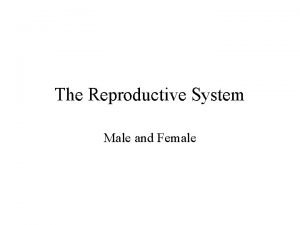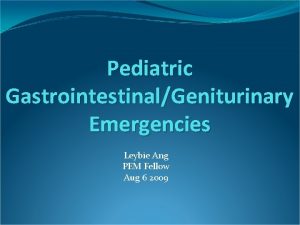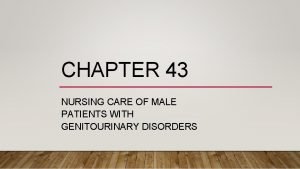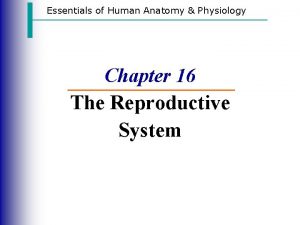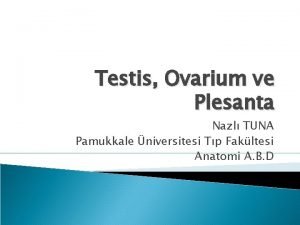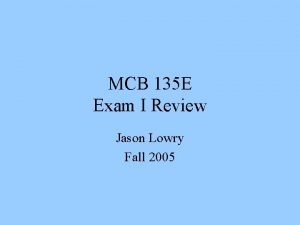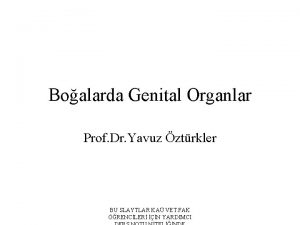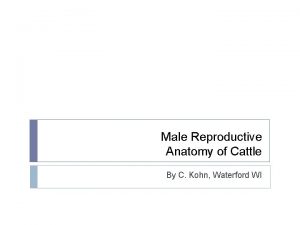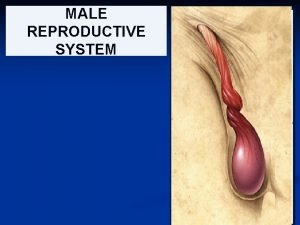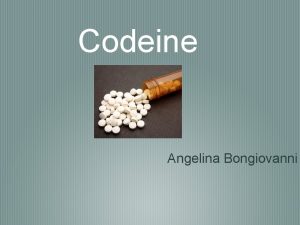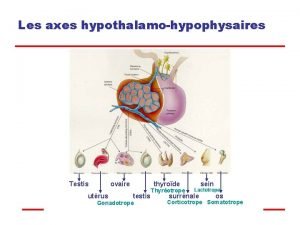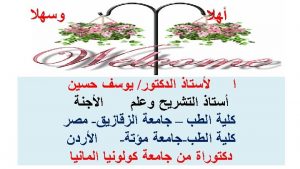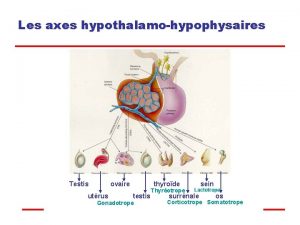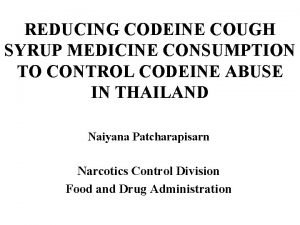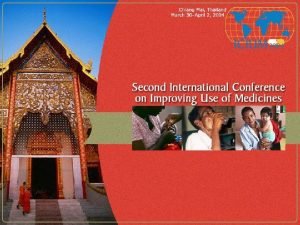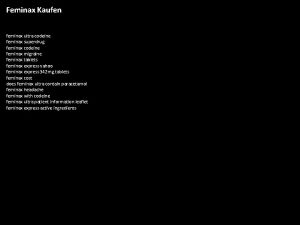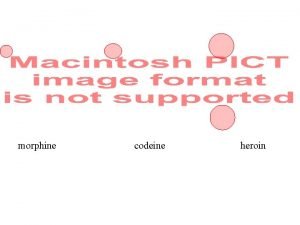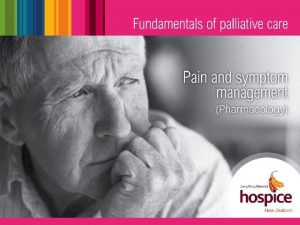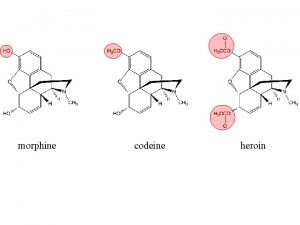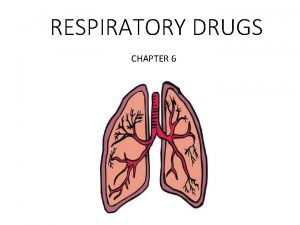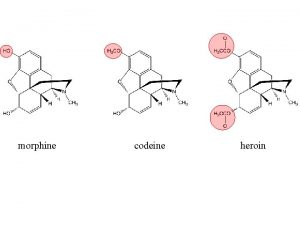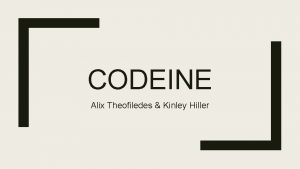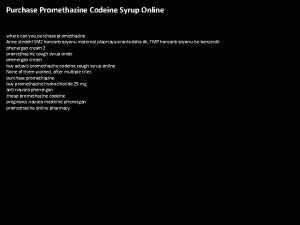EFFECTS OF CODEINE ON THE TESTIS OF ADULT







































- Slides: 39

EFFECTS OF CODEINE ON THE TESTIS OF ADULT ALBINO MALE WISTER RATS By Ogundigie O. Peter and Okwuonu C. U.

Abstract The general public and or students in tertiary institutions inclusive often fall prey to the predatory enticing influence of codeine over-dosage which according to these victims helps them when they undertake strenuous activities by relieving them of pain. Oversupply of codeine doses to the body beyond its relative demand can lead to lifethreatening cases and malfunctioning of viscera organs that may or may not lead to death.

�The effects of codeine overdose many times affect different organs simultaneously however this work studied the effects of codeine on testis using albino Wister rats and how it could lead to testicular damage. Groups of five male rats were given codeine at 0, 30, 60, 90 and 120 mg/kg body weight. Final mean body weights of all the groups increased when compared to their initial mean weights. Testicular weight reduction was observed in the treated groups when compared with group 1 (control).

� Comparative normalcy for the mean spleen weight was observed when compared with group 1 (control) while the mean liver weight increased with group 3 (60 mg/kg bwt-1) having the highest mean liver weight. Histological, testicular anomaly of the interstitial spaces was observed in all codeine treated groups. In an increasing order of 30%, 60 %, and 90 % and 120% being the worst case. A prolonged exposure at higher dosage, 120 mg bwt-1 and above may lead to severe accruing testicular damage.

INTRODUCTION � According to numerous reports by organizations including the World Health Organization and its League of Nations predecessor agency, codeine is one of the most commonly used opiate drugs (Jillian, 2010). Although codeine may be physiologically addicting in high doses, they are widely used as a painkiller, just as it can be used for analgesic and sedative purposes. Codeine, generally classified as a narcotic, is an opiate which is also, known as methyl morphine.

� Codeine is typically taken orally, as either a tablet of pure codeine or a pill that combines aspirin or acetaminophen with codeine. Prolonged use of codeine leads to the development of a tolerance to the side effects. The majority of people addicted to codeine are young adults, or college students. Most students embark on an insatiable quest for codeine due to their agoraphobic lifestyles. Codeine in itself is not illegal however agoraphobic individuals have abused the essence of the drug making it to be seen generally by the populace as wrong and prohibited.

STATEMENT OF PROBLEM � Codeine is a strong pain reliever and it is often used by many, especially young adults. Most children in Nigeria today would really reel to you the names of existing hard drugs such as cocaine, heroin, Indian hemp and a few others which bear criminal tags. These hard drugs are banned from open sale and consumption. � The reality today however is that Nigerians do not consider an ordinary drug such as codeine as a hard drug despite its adverse effects when consumed out of proportion.

� The demand for products containing codeine has obviously beaten the standard set by cocaine addicts and has got so alarming that codeine will not be sold except with a medical doctor’s prescription. However these youths find their way out. � Unregulated small shop owners who now thrive in the trade of selling codeine usually do not attract the attention of relevant regulating agencies. Codeine (tablet or syrup) is often mixed with drinks such as ribena and coke by young adults to hide their addiction from their parents, siblings and friends or in public places without the suspicion of others.

� The bioavailability of orally administered codeine in man which is 60% (Yuan et al. , 1994) exposes the abuser to the potency of the drug when consumed over a long duration. Research studies on codeine have shown that codeine has pharmacological effects on the central nervous system such as analgesia, drowsiness, mood changes, respiratory depression, nausea, and dysfunction of the endocrine and the autonomic nervous systems and the gastrointestinal � Owing to the cheap availability of the drug, students purchase it at large quantities for

� recreational use. The agoraphobic of students fuels the desire to purchase the drugs solely for its ability to cause a sense of highness. This sense of highness experienced by students in recent times has been unwatched by most, however, prolonged use of codeine leads to tolerance of the side effects. Research studies on codeine have shown that codeine has pharmacological effects on the central nervous system such as analgesia, drowsiness, mood changes, respiratory depression, nausea, and dysfunction of the endocrine and the autonomic nervous systems and the gastrointestinal tract such as decreased gastrointestinal motility (Jaffe and Martin, 1990).

� Abusers of codeine experience some and for others, all of these effects of codeine which could leave them at risk of a life threatening condition. Life threatening conditions occur as a result of the distortion of cellular structures and impairment of their functions. Cellular changes lead to body organs and body system changes over time. Despite, its effects on different systems of the body this project research work deliberates on codeine effects on the testis in adult male waster rats.

HYPOTHESIS AND ASSUMPTIONS � Hypothesis is an assumed tentative statement that is subject to further investigation. It is on the basis of this focus that the following hypothesis becomes relevant. � HO 1: Codeine abuse leads to weight loss when food consumption is not increased. � HO 2: Codeine leads to testicular damage.

STUDY OBJECTIVES � The aim of this study is to know whether the effects of codeine are dosage dependent or duration dependent with a view to know whether codeine has negative or positive effects on the testis in adult male wistar rats. Briefly; � a) To know if the effects of codeine are dosage dependent or duration dependent on adult male wistar rat testis. � b) To know if codeine has effects on the histo-architecture of the testis in adult male wistar rats.

SIGNIFICANCE OF STUDY This study will form the basis of stopping codeine abuse in tertiary institutions before it becomes a serious issue. The study will add to the existing wealth of knowledge in the field of anatomy and serves as a reference material for further research studies.

PHYSICAL PROPERTIES OF CODEINE Chemical Formula C 18 H 21 NO 3 Molecular Weight 299. 36 g/ mol Specific Gravity 1. 32 (20/4 0 C) Boiling Point 2500 C Melting Point 154 – 1560 C Sublimation 1400 C to 1450 C at a pressure 1. 5 mm. Hg Solubility in water 1: 120 Solubility in ether 1: 18 Solubility in chloroform 1: 5 Solubility in alcohol 1: 2 Source: (Willette, 1991) Pharmacokinetic 6. 05 at 150 C


MATERIALS AND METHODS ANIMAL CARE AND MANAGEMENT � Twenty five (9 weeks old) adult male Wistar rats were purchased from the holdings of the Department of Anatomy, School of Basic Medical Sciences, Igbinedion University Okada. The animals were allowed access to growers mash manufactured by Premier Feeds Mills Co. Ltd. (a subsidiary of flour mills of Nigeria Plc) and water ad libitum. Rats were quarantined for 2 weeks and were housed five per cage. The animals were weighed weekly from the day of receipt to the day of sacrificing and necropsy. Details of the study design are summarized in table 3.

DRUG PROCUREMENT � Dihydrocodeine drugs (30 mg per tablet) were obtained from Monic Tee Pharmacy, Benin City, Edo State by the authority of the department of Anatomy, School of Basic Medical Sciences, Igbinedion University Okada. They were kept tightly closed in a container at room temperature and away from excess heat and moisture

EXPERIMENTAL GROUPS GROUP Number of Codeine dose Days of Number of rats before per kilogram Studies rats after administratio body weight administratio n of codeine 1 5 0 14 5 2 5 30 14 5 3 5 60 14 4 4 5 90 14 5 5 5 120 14 5

SACRIFICE OF ANIMALS AND SURGICAL REMOVAL OF TISSUES � At the end of the experiment period, the animal’s final body weight was determined using a top loader weighing balance. A midline incision was made through the anterior abdominal walls of the rat under chloroform anesthesia. The testis were excised, weighed and fixed in Bouin’s fluid for 48 hours. The liver and spleen were excised, weighed and fixed in form saline for 48 hours.

TISSUE PROCESSING � The tissues were trimmed to about 3 -5 mm thick sections and processed via paraffin wax embedding method of Drury and Wallington (1980). The tissues were dehydrated for one hour each at room temperature through ascending grades of ethanol: 70% ethanol, 90% ethanol, Absolute ethanol II. Dehydrated tissues would be cleared at room temperature in two changes of xylene for one hour in each change. The tissues were then infiltrated in two changes of molten paraffin wax at 60 degree Celsius

� for one hour in each change and finally embedded in paraffin wax multi-block plastic embedding molds. The paraffin blocked tissue were trimmed and mounted on wooden block for sectioning on a rotary microtome. Sections of 5 um thickness were produced from the tissues were then transferred into the water bath (40 degree Celsius) to allow spreading of the folded ribbons of sections. These sections would be mounted on new clean glass slides. These were dried at 40 degree Celsius on a slide drier to enhance adherence of the sections of the slides.

EXPERIMENTAL DESIGN 14 - DAY STUDIES Study Laboratory Animal House, Okada Department of Anatomy, School of Basic Medical Sciences, Igbinedion Animal Source University Okada. Species Wistar Rats Age of Animals 9 weeks Time held before studies 2 weeks Average Age when studies began 11 weeks Date of first dose 25 th June, 2015 Date of last dose 8 th June, 2015

Duration of dosing 14 Days Date of Sacrificing 9 th June, 2015 Average Age of Sacrificing 13 weeks old Size of Study Groups 5 males Animals per cage 5 Growers Mash manufactured by Diet Premier Feeds Mills Co. Ltd Water ad. Libitum Fresh Tap Water Cage Opaque Rat Cages Bedding Saw dust Animal Room Environment Temperature: 37 c Permanent colours of different colours Method of Animal Identification for the groups

Observed daily; the rats were weighed initially, after the first week and at the end of the studies. Physical Type and Frequency of Observations were made daily Method of Sacrifice Chloroform Anesthesia Organ removal was performed on all rats. Organs weighed were the testis, Sacrifice and Necropsy liver, and spleen.

RESULTS SURVIVAL AND MEAN BODY WEIGHT (kilogram) OF RATS IN GROUP 1 -5 Codeine(mg/ kg body weight) 0 30 60 90 120 Survival 5/5 4/5 5/5 Initial Mean Final Mean Body body weight ± Weight SD SD (Change) 0. 142 ± 0. 020 0. 178 ± 0. 040 0. 036 0. 162 ± 0. 018 0. 190 ± 0. 023 0. 028 0. 162 ± 0. 022 0. 210 ± 0. 023 0. 048 0. 152 ± 0. 022 0. 188 ± 0. 020 0. 036 0. 150 ± 0. 020 0. 180 ± 0. 023 0. 030 * Unit of weight measurement is in kilograms * Note: one rat in group 2 died four days after commencing codeine administration

� In this research study, the table above indicates the mean body weights of the rats of group 1 -5. Although feed consumption by the codeine exposed groups increased, the rate of feed consumption was greater in the controls during the codeine administration. The foregoing conclusion was drawn based on weight gain in all groups. � No chemical related gross lesions were observed in rats at sacrifice and necropsy.

MEAN ORGAN WEIGHTS (grams) AT SACRIFICING AND NECROPSY OF GROUP 1 -5 GROUP 2 GROUP 3 GROUP 4 GROUP 5 LIVER CONTROL GROUP 5. 96 ± 2. 16 4. 71 ± 0. 67 7. 38 ± 0. 79 7. 05 ± 0. 64 7. 12 ± 2. 11 TESTIS 2. 62 ± 0. 54 1. 92 ± 0. 40 2. 06 ± 0. 32 2. 28 ± 0. 13 1. 72 ± 0. 53 SPLEEN 0. 37 ± 0. 07 0. 35 ± 0. 14 0. 46 ± 0. 08 0. 43 ± 0. 10 0. 38 ± 0. 10 *unit of weight measurement is in gram In the table below, the mean organ weights of the harvested organs of rats in group 1 -5 are tabulated. The weights of the testis of codeine exposed groups were lower than that of the controls. There was relative liver weight increase in the codeine exposed groups and reduced organ weights of the spleen and testis in groups 3 and 4 (90 mg/kg and 120 mg/kg respectively).

250 200 150 100 50 0 CONTROL WEEK 1 GROUP 2 WEEK 2 GROUP 3 WEEK 3 GROUP 4 WEEK 4 GROUP 5 WEEK 5 FIG 5; MEAN BODY WEIGHT OF RATS IN GROUP 1 -5

v The graph above explains the increase in mean body weight gain across the groups from the control group to group 4. Codeine administration commenced week 3. v The weekly growth of each group is seen as the columns for each group. v Group 1 experienced a greater weight gain than Group 5 in the study at a ratio of 36 g: 30 g respectively. v Increase in dose above 60 mg/kg body weight reduced weight gain therefore a threshold was observed between group 3 and group 4

8 7 6 5 4 3 2 1 0 CONTROL GROUP 2 LIVER � GROUP 3 TESTIS GROUP 4 GROUP 5 SPLEEN FIG 6; MEAN ORGAN WEIGHTS OF RATS IN GROUP 1 -5

v The table above explains the increase in the liver weight, reduction of the weights of the testis and no significant change in spleen across the groups. � There was increase in group 3 mean body weight which also influenced the liver weight in group 3. The mean body weight of rats in group 3 also had a direct effect on the mean liver weight of rats in group 3. However, the mean liver weights of rats in group 4 and 5 did not change significantly which is also reflected in table 4.

HISTOLOGICAL FINDINGS Photomicrograph of Testis of Rats in Group 1 (Control), showing the normal Lumen of the Seminiferous Tubules, well displayed Sperm Cells and Leydig Cells in the Interstitial Spaces (x 10).

FIG 7: Normal (x 10) (Control) FIG 7: Normal(x 10) (Control) FIG 8: Group 2(30 mg/kg b. wt) (x 10) Note; widening of interstitial spaces FIG 9: Group 3 (60 mg/ kg b. wt)(x 10) Note; widening of interstitial spaces

FIG 7; Normal (x 10) (Control) FIG 10: Group 4(90 mg/ kg b. wt) (x 10) Note; widening of interstitial spaces FIG 7; Normal (x 10) (Control) FIG 11; Group 5(120 mg/kg b. wt) (x 10) Note; widening of interstitial spaces

� Data obtained in the analysis of testicular histology of rats from the control and codeine exposed groups showed a range of differences in the size, shape and uniformity of tubular arrangement. Result of testis histology in the control group showed normal and undisturbed pattern in the arrangement and shape of seminiferous tubules while histological analysis done on the codeine exposed groups resulted in changes involving the non-intact arrangements of seminiferous tubules, thus leading to development of a wide space between the tubules, besides the shape of the tubules becoming enlarged.

� The lumens of the seminiferous tubules in the codeine exposed groups were occluded by the tails of spermatids as seen in the photomicrographs. It was seen that spermatogenesis took place in both the control group and the codeine exposed groups. Result from the control group showed a normal spermatogenesis cycle with even distribution of every cell stage throughout the tubules. Spermatogonia grew into maturity in all tubules. Meanwhile, in the codeine exposed groups, spermatogenesis took place in all tubules but at increased efficacy.

CONCLUSION � With the results obtained, it can be seen that codeine effects are both duration dependent and dosage dependent. Codeine use is certified as beneficial and advantageous when consumed as stated by health professionals. However, abusive use of codeine can be lifethreatening which can be seen in the histological findings as demonstrated in this study.

� The government should set policies to regulate codeine use amongst the populace and stop codeine abuse amongst the youths to prevent infertility at a major scale due to its current high availability amongst youths. These research findings should be brought to light because codeine abuse but not its primary use is noxious. � In regard to the foregoing, I recommend that rats or mice should be exposed chronically to codeine.
 Clarix codeine
Clarix codeine Morfine lolly
Morfine lolly How is sperm produced and released
How is sperm produced and released Functions of testis
Functions of testis Lig testis proprium
Lig testis proprium Figure 16-2 is a longitudinal section of a testis
Figure 16-2 is a longitudinal section of a testis Torsio testis
Torsio testis Doç dr ferhat ateş
Doç dr ferhat ateş Testis
Testis Spermatid
Spermatid Colliculus spermaticus
Colliculus spermaticus Oogenesi
Oogenesi Kode icd 10 mastitis mamae
Kode icd 10 mastitis mamae Dr bobby urologi
Dr bobby urologi Fungsi testis
Fungsi testis Gliserofosfokolin sperm
Gliserofosfokolin sperm Simetri tubuh platyhelminthes nemathelminthes dan annelida
Simetri tubuh platyhelminthes nemathelminthes dan annelida Retractiele testis
Retractiele testis Seminom
Seminom Orchiopexia
Orchiopexia Keratan membujur testis
Keratan membujur testis Tubuli recti
Tubuli recti Prader evrelemesi
Prader evrelemesi Soermatic cord
Soermatic cord Gambar spermatogenesis dan oogenesis beserta keterangannya
Gambar spermatogenesis dan oogenesis beserta keterangannya Seminal tubules
Seminal tubules Prehn's test
Prehn's test Nursing diagnosis for undescended testis
Nursing diagnosis for undescended testis Tanner meme evrelemesi
Tanner meme evrelemesi Corpus cavernosum
Corpus cavernosum Tunica vaginalis
Tunica vaginalis Scrotum tabakaları
Scrotum tabakaları Testis
Testis In pila testis is closely attach with the
In pila testis is closely attach with the Coverings of spermatic cord
Coverings of spermatic cord Sinal de pren
Sinal de pren Neural groove
Neural groove Tunica testis katmanları
Tunica testis katmanları Male cow reproductive system diagram
Male cow reproductive system diagram Testis
Testis
